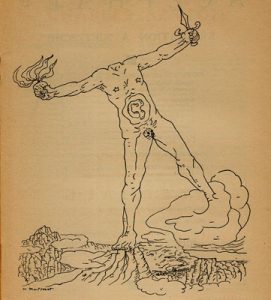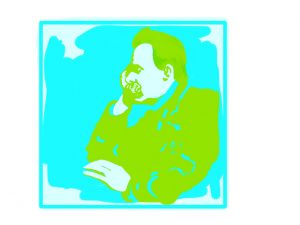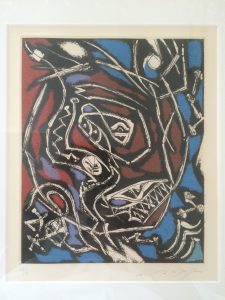Georges Bataille’s On Nietzsche (1937-1945)
with Denis Hollier, Rosalind Morris, and Anthony Vidler
At the very same moment that Martin Heidegger began lecturing on Nietzsche at the University of Freiberg in the winter of 1936-1937, Georges Bataille and a handful of his closest intellectual collaborators—including the artist, André Masson, and the philosophers Jean Wahl and Pierre Klossowski, among others—published the second volume of their new review, Acéphale: religion, sociologie, philosophie.
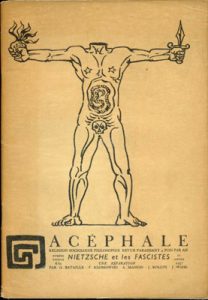 The date of publication is January 1937. The title, “Nietzsche et les Fascistes: Une Réparation.” A reparation. A repair. At the head of the table of contents, it is written in block letters “RÉPARATION À NIETZSCHE.” Reparations to Nietzsche. And the volume is illustrated throughout by André Masson’s drawings of these headless and groinless figures of Man – or rather, not groinless, but rather castrated and sculled figures of Man. “Acéphale,” as you know, means “headless.”
The date of publication is January 1937. The title, “Nietzsche et les Fascistes: Une Réparation.” A reparation. A repair. At the head of the table of contents, it is written in block letters “RÉPARATION À NIETZSCHE.” Reparations to Nietzsche. And the volume is illustrated throughout by André Masson’s drawings of these headless and groinless figures of Man – or rather, not groinless, but rather castrated and sculled figures of Man. “Acéphale,” as you know, means “headless.”
This headless man, Bataille believed, would point us both to the “surhumain” (the superhuman) and to the death of God. L’acéphale, the headless man, Bataille would write in his essay “Propositions,” is the mythic representation of “the superhuman that IS fully ‘death of God.’” (“Proposition,” n. 6).
The volume is dedicated to recuperating Nietzsche from the fascists. The lead article—“Nietzsche et les Fascistes”—is a violent diatribe against Elisabeth Föerster-Nietzsche, somewhat curiously renamed “Elisabeth Judas-Föerster,” as well as thinkers who, according to Bataille, had distorted and abused Nietzsche’s words—including Georg Lukacs on the left, but mostly Alfred Rosenberg, Alfred Baeumler, and other contemporary fascist thinkers who had misappropriated Nietzsche’s work, pilfered quotations out of context, betrayed his thought. The volume could be retitled, in light of the untimely meditation, “The Uses and Abuses of Nietzsche.”
But of course Bataille and his collective did more than just take Nietzsche back from the hands of the fascists, they also produced a certain Nietzsche, one they hoped that would be more resistant to future appropriation and misappropriation. On their view, Nietzsche’s thought could not be put to use: in capital letters, they would write, “LA DOCTRINE DE NIETZSCHE NE PEUT PAS ETRE ASSERVIE.” It cannot be made to serve, to be used. “Nietzsche s’adressait à des esprits libres, incapables de se laisser utiliser.”
The reading they would develop was somewhat dogmatic. There is a right, and a wrong reading of Nietzsche, and on the correct reading, Nietzsche, they would argue, is entirely incompatible with fascism. “Fascisme et nietzscheisme s’excluent, s’excluent même avec violence, dès que l’un et l’autre sont considérés dans leur totalité,” they would write. “D’un côté la vie s’enchaîne et se stabilise dans une servitude sans fin, de l’autre souffle non seulement l’air libre mais un vent de bourrasque; d’un côté le charme de la culture humaine est brisé pour laisser la place à la force vulgaire, de l’autre la force et la violence sont vouées tragiquement à ce charme.”
Through the Acéphale journal and other collective projects—such as the Collège de Sociologie (1937-1939) and later the review Critique—Bataille and his collective built a bulwark to keep God death and to entrench a certain agonistic reading of Nietzsche.
Theirs was a collective that privileged the social, especially fraternal relations—these were men’s men—over the individualist focus of the Surrealists, as Denis Hollier explains well in his preface to the collected texts of the Collège de Sociologie. They were, in Hollier’s words, “mad—mad for society… The King had his jester. Well, they were the jesters of a society without a King.”[i] They would come to resemble a fraternal order or, in Hollier’s words, “les chevaliers de l’Ordre des Sociologues” (the Knights of the Order of Sociologists). In this, Bataille was surely reaching back to his flirtation with priesthood, back also to his thesis at the École nationale des Chartes, which was an edition of the medieval manuscript L’Ordène de chevalerie.
Both the content and the form of these collective projects would point to the ethic of knights: a central theme, at the Collège, was the critique of the modern descent into militarized war and the aristocratic yearning for the days of noble combat; the form, at the Collège at least, was what Hollier would describe as “une organization collégiale, une cléricature.”[ii] As my colleague Jesús Velasco reminds us, “Évidemment, Bataille was a medievalist. He edited one of my key texts ever, a late 12th or early 13th century poem L’ordène de chevalerie, in which a prisoner of war, Hue de Tabarie (or Hugh of the Tiberiad) is reeducated by none other than Saladin, the one who recovered Jerusalem from the Leper King, Baldwin IVth.”
Most of Bataille’s collective projects—Acéphale, the Collège, Critique—can be interpreted in light of a fraternal yearning, one that (perhaps like Nietzsche’s, oddly) was somehow tied to deep loneliness, to the point of a certain fear of madness. According to Bataille’s personal journals during the war, Nietzsche was a lifeline. Reading Nietzsche kept Bataille sane—or insane, as Bataille would ambiguously suggest—and prodded him, painfully, anxiously, to experience life to its fullest, to the limit.
“With few exceptions,” Bataille wrote in 1944, “my company on earth is Nietzsche.” “Nietzsche seul s’est rendu solidaire de moi — disons nous.” [“Nietzsche alone has made himself one with me – or rather, let’s say, with us.”] (SN, 27; ON, 3)
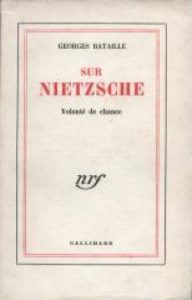 Bataille wrote On Nietzsche during the war, predominantly, he tells us, between February and August 1944 with the intent of publishing it on the hundredth birthday of Nietzsche, on October 15, 1944. (SN, 15; ON, xxiv) He would include it later in what he would call his Somme athéologique, a play on words on Thomas Aquinas’s Summa Theologica, which is, as Jesús Velasco reminds us, essential to understanding the work’s political theology. Bataille’s Summa was intended in large part to entrench the death of God—as if we had to do it over and over again—but served also to gesture toward practically a new dogma. Aphoristic in nature, like Nietzsche’s writings, Bataille’s writings on Nietzsche would read like a deep personal quest, practically a life-or-death struggle, and a constant limit experience to get beyond good and evil.
Bataille wrote On Nietzsche during the war, predominantly, he tells us, between February and August 1944 with the intent of publishing it on the hundredth birthday of Nietzsche, on October 15, 1944. (SN, 15; ON, xxiv) He would include it later in what he would call his Somme athéologique, a play on words on Thomas Aquinas’s Summa Theologica, which is, as Jesús Velasco reminds us, essential to understanding the work’s political theology. Bataille’s Summa was intended in large part to entrench the death of God—as if we had to do it over and over again—but served also to gesture toward practically a new dogma. Aphoristic in nature, like Nietzsche’s writings, Bataille’s writings on Nietzsche would read like a deep personal quest, practically a life-or-death struggle, and a constant limit experience to get beyond good and evil.
 Aphoristic, no doubt. The editors at Gallimard, as Michel Foucault would note in his preface to the first volume of the Oeuvres completes, would specifically catalogue these writings in volume V of the complete works, as Bataille’s “Textes aphoristiques (1940-1961), regroupé autour de la Somme athéologique.”[iii]
Aphoristic, no doubt. The editors at Gallimard, as Michel Foucault would note in his preface to the first volume of the Oeuvres completes, would specifically catalogue these writings in volume V of the complete works, as Bataille’s “Textes aphoristiques (1940-1961), regroupé autour de la Somme athéologique.”[iii]
A personal, limit experience as well. As Foucault would note, “la Somme athéologique a fait entrer la pensée dans le jeu – dans le jeu risqué – de la limite, de l’extrême, du sommet, du transgressif.”[iv] [“The Atheological Summa has introduced thought to the game – in the risky game – of the limit, the extreme, the summit, the transgressive.”] It is precisely this work that would lead Foucault to experience philosophy as experience: in contrast to traditional philosophical discourse and debates, which, in Foucault’s view, had become no more than “doing the history of philosophy” (DE, tome IV, 48). Bataille and Nietzsche, Bataille on Nietzsche (as well as Blanchot and Klossowski) taught Foucault a way to do philosophy as experimentation on the self, as limit experience, as ways to tear oneself from oneself in order to become someone new and produce new work:
“L’idée d’une expérience limite, qui arrache le sujet à lui-même, voilà ce qui a été important pour moi dans la lecture de Nietzsche, de Bataille, de Blanchot, et qui a fait que, aussi ennuyeux, aussi érudits que soient mes livres, je les ai toujours conçus comme des expériences directes visant à m’arracher à moi-même, à m’empêcher d’être le même.” (DE, tome IV, 43).
“Je suis un expérimentateur, et non pas un théoricien […] J’écris pour me changer moi-même et ne plus penser la même chose qu’auparavant” (DE, tome IV, 41-42).[v]
Bataille’s writings would inspire Foucault and a generation of critical thinkers to think differently. As Foucault would note in his “Preface to Transgression” written about Bataille, “The twentieth century will undoubtedly have discovered the related categories of exhaustion, excess, the limit, and transgression—the strange and unyielding form of these irrevocable movements which consume and consummate us.”[vi]
In reading the later parts of the work, from June through August 1944—which are essentially his diaries and journals written during the end of the war from his home in Vézelay—one feels that indeed, throughout the wartime period, throughout the bombardments, the air raids, the firefights of others, Bataille’s only intellectual companion is Nietzsche and, with the exception of his lover “K.”, it is practically only Nietzsche that is his only human contact—though Proust, Blake, and a few others appear here and there.
In these wartime journals, Bataille presents his relationship with Nietzsche as an impossible one. A struggle. A defeat. A recurring emotional battle to experience Nietzsche’s thought. “This total liberation from human possibility that he defined, of all the possibilities, is without doubt the only one that we have never attempted,” Bataille writes—immodestly adding, to simplify, “except me?” (SN, 13). But even for Bataille, who claims at times to be the only one who may not have completely misunderstood Nietzsche, even Bataille ends up in a state of disarray—of désarroi. (SN, 13; ON, xxi) “I attempted to draw from myself the consequences of a lucid doctrine, one that attracted me as light does; but I only reaped anguish and the impression of most often succumbing.” (SN 13; ON, xxi)
What then does Bataille do with Nietzsche, philosophically or critically?
Well, by contrast to Heidegger who has focused on the notions of “will to power” and “eternal recurrence,” and later, nihilism, Bataille was first drawn to Nietzsche’s writings on the death of God—which, of course, makes sense in relation to his own biography, his conversation to Catholicism in 1914, his devotion to Christ for at least nine years, his temptation to enter the priesthood, and his eventual lapse and renouncement of Christianity in about 1920. So Nietzsche’s writings on the death of God were formative intellectually—and would shape Bataille’s political theology. But more than that, Bataille’s writings On Nietzsche reflect an even deeper engagement with the notion of evil, of le mal, and with the struggle, that consumed him and in which, I feel, he did not feel successful, to get beyond evil. That, I take it, was at the core, at the heart of his solitary and solidary union with Nietzsche. To which we shall now turn.
Welcome to Nietzsche 2/13!
[Read post here. © Bernard E. Harcourt]
NOTES
[i] Denis Hollier, “A l’en-tête d’acéphale,” preface to Le Collège de Sociologie (1937-1939), collected texts edited by Hollier (Paris: Gallimard, 1978), p. 11.
[ii] Ibid., p. 15.
[iii] Michel Foucault, “Présentation,” preface to Volume I of Georges Bataille, Oeuvres completes (Paris: Gallimard nrf, 1970), p. 6.
[iv] Ibid., p. 5.
[v] “I am an experimenter, and not a theoretician […] I write to change my self and to no longer think the same thing that I thought before.”
[vi] Michel Foucault, “A Preface to Transgression,” in Michel Foucault, Language, Counter-Memory, Practice: Selected Essays and Interviews, ed. and trans. Donald F. Bouchard, 1977, p. 49.
Sommaire
“With few exceptions, my best company on earth is that of Nietzsche,” Georges Bataille would write in 1944. Bataille would add: “I am the only one who presents himself, not as a glossator of Nietzsche, but as being Nietzsche himself.” Indeed, very early on, Georges Bataille drew on Nietzsche’s thought, finding in it a source of inspiration for his social-anarchist, anti-fascist beliefs. He resisted a narrow or ideological reading of Nietzsche, instead proposing a more holistic interpretation that would be highly influential on contemporary critical thought. In 1937, along with Jean Wahl, Pierre Klossowski, and André Masson, Bataille would edit an important collection of essays on Nietzsche in their review, Acéphale: religion, sociologie, philosophie. This publication would revive interest in Nietzsche’s thought on the Left in Europe during the war and post-war period, and lay the groundwork for readings of Nietzsche in the 1960s.
André Masson

